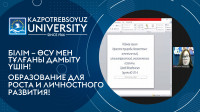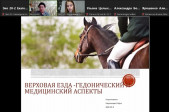"RUKHANI ZHANGYRU" - A NEW PHILOSOPHY OF KAZAKHSTAN: EQUESTRIAN CULTURE".
 On December 7, 2021, a round table "Rukhani zhangyru" - a new philosophy of Kazakhstan: Equestrian culture" was held at the Karaganda University of Kazpotrebsoyuz in an online format.
On December 7, 2021, a round table "Rukhani zhangyru" - a new philosophy of Kazakhstan: Equestrian culture" was held at the Karaganda University of Kazpotrebsoyuz in an online format.
The round table was organized by the Department of "Socio-Political Disciplines and the Assembly of People of Kazakhstan" and was held as part of the implementation of the program "Rukhani Zhangyru", the implementation of the contractual theme "Equestrian culture" and the implementation of the initiative theme "Philosophical analysis of the theory and practice of modern education".
Moderator - Ph.D., Professor Klishina M.V. outlined the purpose and objectives of the round table. The Vice-rector for Social Affairs of the University, PhD, Professor Abilov K. Zh. addressed the participants of the conference with a welcoming speech, emphasizing the interdisciplinary nature of the topic, the importance of the topic under discussion in the further research and project activities of students.
Students' reports defining the place of the "new philosophy", which are important in the framework of research activities, the development of creative potential, the formation of a worldview, a culture of thinking and modernization of the public consciousness of students, patriotism, civic responsibility were discussed.:
1. «Strategies "Mangilik El" and the project "Rukhani zhangyru" are new vectors of historical development of Kazakhstan». Tuleuova Aidaria Yu-20-4
2. «Native land. The beauty of Kazakhstan's nature: aesthetic, utilitarian, ecological aspects». Schwab Magdalena Yu-20-4
3. «Horse breeding in Kazakhstan: history and modernity. Stud farms». Abrosimova Ekaterina Eco 20-2
4. «Horse riding - hedonistic and medical aspects». Kyriakidi Sofia ECO-20
5. «Equestrian tourism». Tuleuova Aidaria Yu-20-4
6. «Culture of nomads» Spitsyna M. and Yaroshenko A. FKiSM20-3, etc.
Abilov K.Zh. stressed that the interdisciplinary round table was a bright completion of the study of the disciplines of the socio-humanitarian cycle and showed the high research culture of the participants of the round table.
 |
 |
 |
 |
 |
 |





